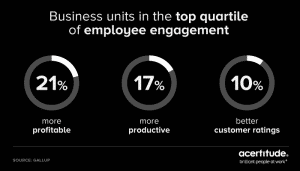A company’s success depends first and foremost upon the success of its employees. As companies search for better ways to attract and retain talent, especially in anticipation of the upcoming talent shortage, it’s easy to forget that even the best talent goes untapped without sufficient workplace engagement. Gallup’s 2017 report on the “State of the American Workplace” defines workforce engagement as a measure of how often employees are involved in, enthusiastic about, and committed to their work and workplace.
Engagement deals primarily with how someone views their position in a company: engaged employees feel understood and supported as a part of a team, while employees who aren’t engaged feel less attached to their work. Employees who feel underappreciated or unsupported at work may even actively disengage themselves due to their unhappiness, resulting in a drastic reduction in productivity, safety, or work quality.
Only 33% of U.S. employees were engaged in 2016. In fact, nationwide employee engagement has barely budged in the last 10 years – engagement in 2006 was at a comparable 30%. This indicates a pervasive and persistent engagement crisis which only worsens when combined with the talent shortage, as companies already struggling to secure the right talent will need to engage those employees or risk their potential going to waste. But is this really such a big deal? What are the actual benefits of workplace engagement?

Understanding the importance of engagement is not enough for any company to increase actual engagement – neither is simply emphasizing engagement without incorporating policies which actively engage employees. In other words, putting together a survey to measure worker satisfaction won’t do much to improve employee engagement. Many companies fall into the unhelpful habit of categorizing and measuring engagement quite thoroughly without following through when the time comes for action and improvement. Alternatively, some companies reason that increasing employee happiness is the best way to improve engagement. While happiness certainly contributes to engagement, the most effective way to increase workforce engagement is surprisingly simple, and much more concrete.
The most effective way to increase employee engagement, as Gallup suggests, is for organizations to treat employees as stakeholders of their future and the company’s future. Engagement soars when employees feel integrated into and fulfilled by their work. Treating employees as stakeholders also fosters a team mentality which infuses a workplace with positivity. This means that engagement depends largely upon company leaders to communicate effectively and develop an environment where employees see themselves as integral pieces of their company. For companies interested in reaping the benefits of workforce engagement: work from the top down by ensuring that company leaders instill a sense of purpose in the workplace.
About Talencio: We help the Health Technology community make progress by putting the right people in the right place to solve problems and identify opportunities to move humanity forward. To learn more about opportunities in the health technology field, or to hear how other companies have partnered with Talencio to tap into our skilled professional talent pool, contact us at 612.703.4236 or email. Talencio has been the preferred provider of vetted, accomplished professionals to the Health Technology Community for over 9 years.
Written by: Jonah Mische, Talencio intern and student at Davidson College, Davidson, North Carolina.
Source:
State of the American Workplace, Gallup
